In the late 1960s, two notorious opium traffickers from mainland China founded a newspaper in Hong Kong. Filling a gap in the market, the Oriental Daily News, with its racy pictures, celebrity scoops and crime yarns, quickly established itself as the city’s best-read tabloid — until the Apple Daily blazed onto newstands in 1995.
As Jimmy Lai’s pro-democracy paper ate into the Oriental Daily News’ readership, a deep, personal vendetta took root between the latter publication’s founders, by then fugitives in Taiwan, and the newcomer.
Since at least 2013, the Oriental Daily News has funded an eight-person team of reporters to pursue Lai day and night, even photographing him taking medicine in a clinic, a court heard last month; in 2014, the Oriental Daily News published an obituary claiming a man with Lai’s name died from AIDS and the paper has published hundreds of articles on Lai’s personal life and politics, frequently branding him a “national traitor” for his anti-Beijing stance.
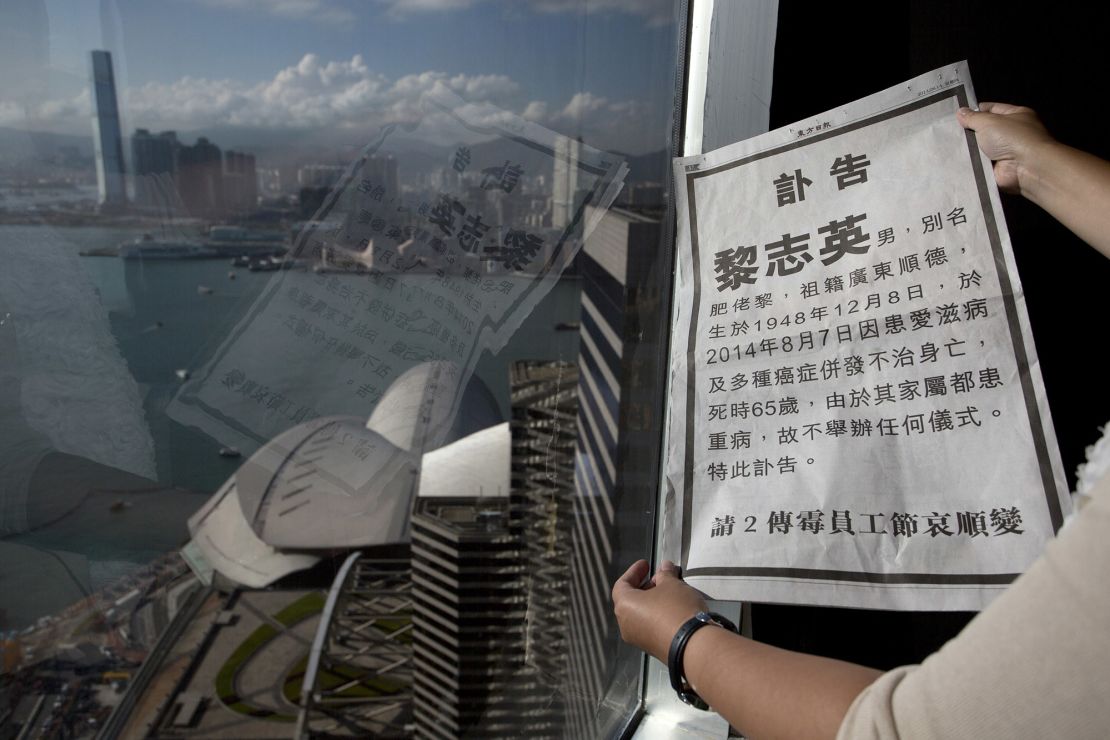
After decades of dispute, the two rivals this summer finally had their day in court, as Lai faced a charge of intimidating an Oriental Daily News reporter.
On June 4, 2017, on a night when thousands of cellphones glowed in Victoria Park at an annual vigil for the Tiananmen Square massacre of 1989, Lai was filmed shouting at a reporter from the Oriental Daily News, who had been tailing and recording him for about three hours.
In footage shown to the court, Lai points his finger at the reporter, swears at him in Cantonese, and says: “I will definitely find someone to mess with you.” The reporter, whose identity is protected by an anonymity order, said Lai was threatening him physically, and that he suffered psychologically from the episode. Prosecutors said Lai was at a public event where reporters had the right to photograph him.
Lai pleaded not guilty to the charge of criminal intimidation, which carries a maximum sentence of two years, and on Thursday was acquitted. “I am not worried at all, because this is a minor case and the charge felt forced,” he said, before the trial began.
In recent years, Lai has made bigger enemies than the Oriental Daily News, as he vigorously opposes Beijing’s influence on Hong Kong. The septuagenarian is facing a slew of criminal charges, including several under Hong Kong’s sweeping new national security law, which carries a maximum sentence of life imprisonment.
Any jail sentence threatens Lai’s ability to run Apple Daily at a time when it is under unparalleled pressure: on August 10, the newsroom was stormed by 200 police officers, as Lai was arrested under the city’s national security law on suspicion of colluding with foreign forces to endanger national security, conspiracy to defraud and intention to incite succession, cases which have yet to come to trial.
“It would be difficult for Apply Daily to survive if Lai was jailed,” said Willy Lam, a professor in history at the Chinese University of Hong Kong and a former journalist, adding that survival strategies were likely being put in place at the newspaper for that scenario.
“Lai is not the editor, but he is the person providing the money for the paper and the symbol of defiance. He is a symbol of freedom of the media, in both Hong Kong and the Western world.”
An opium fugitive
In 1977, the Hong Kong Police issued arrest warrants for two brothers they alleged had smuggled 700 tonnes of heroin into Hong Kong between 1968 and 1974 from Asia’s Golden Triangle.
But before officers had the opportunity to arrest Ma Sik-yu, widely known as White Powder Ma, he escaped to the neighboring island of Taiwan, which has no extradition treaty with Hong Kong. His younger brother Ma Sik-chun wasn’t so fast: he was arrested but managed to slip out of the city the next year by boat while on bail.
The pair lived the rest of their lives as fugitives in self-governing Taiwan, managing their media empire from afar.
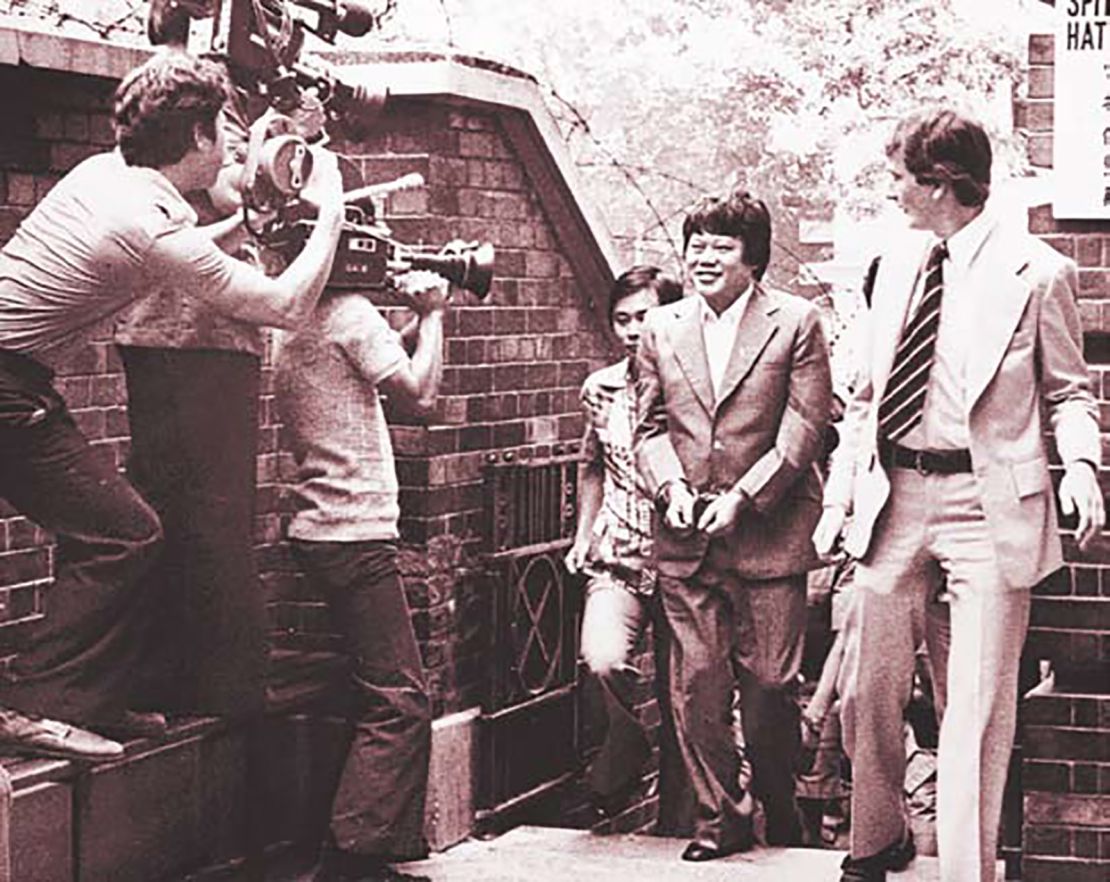
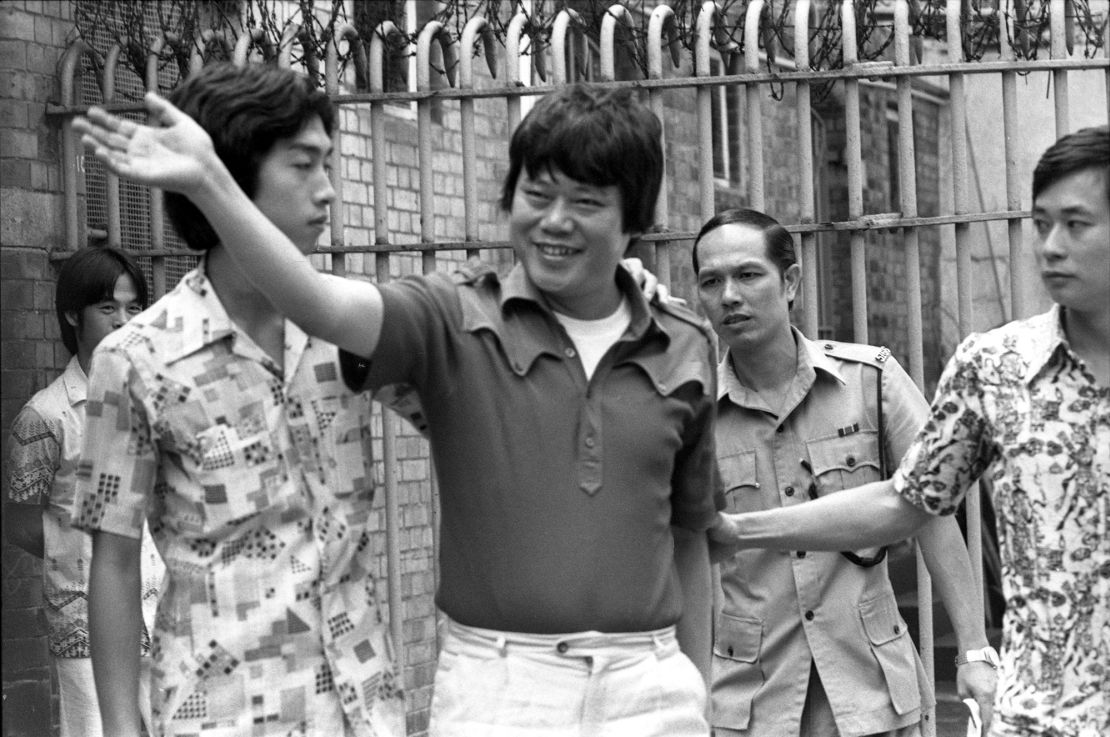
In January 1969, the Mas founded the Oriental Daily News. In their absence, the paper was run by Ma Ching-kwan, the younger brother’s son. Under his steerage, the newspaper became an important tool to lobby for the fugitives’ return.
“After that, the entire mission of that newspaper group was one thing: get them (the brothers) back to Hong Kong,” says Mark Simon, a senior executive of Next Digital, which publishes the Apple Daily — his view was echoed by others who spoke to CNN on the condition of anonymity.
In 1994, the English-language Eastern Express newspaper was founded by the Oriental Press Group, which publishes the Oriental Daily News, to connect with Hong Kong’s English-speaking elites who ruled the then-British colony, and ultimately decided the fugitives’ fate. It also added a more august title to the family stable, lending them more respectability, but the publication quickly folded due to poor advertising revenue and readership.
In 1996, a lawyer asked the government what would happen were Ma to return to Hong Kong. Drug-trafficking charges in Hong Kong, however, do not expire.
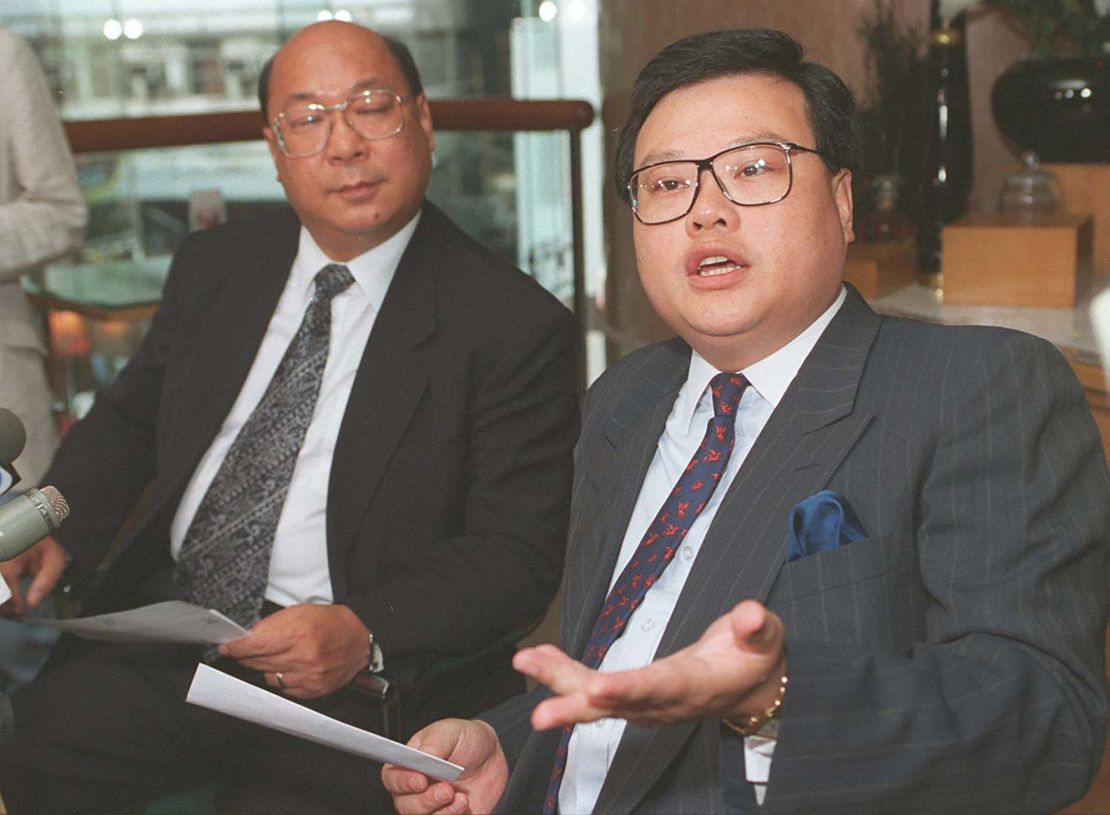
In 1998, the year after Hong Kong transitioned from British to mainland Chinese rule, the Oriental Daily News revealed Ma Ching-kwan had donated $1.7 million to Britain’s then ruling Conservative Party in 1994 for “certain commitments,” which it said had not been fulfilled. The governor of Hong Kong from 1992 until 1997 was a Conservative Party politician.
Publishing a photograph of Ma Ching-kwan with British Prime Minister John Major, and a menu from a dinner at 10 Downing Street he had attended on September 27, 1994 — three months after the donation had been made — the newspaper demanded a refund.
”We will categorically say that the Conservative Party did not or would not accept donations conditional on favors,” an unnamed spokesman for the Conservative Party was quoted as saying in 1998 in British newspaper, The Independent.
After White Powder Ma died in 1998, his younger brother was alone in Taiwan. Some, however, doubted Ma Ching-kwan ever really wanted his father back on home soil.
“If his father came back, he would no longer be the king of the paper,” said a long-time observer of the Oriental Daily News, who requested anonymity. “As it was, he had to send the front pages of the paper every day to Taiwan for approval before they hit the presses.”
In 2015, Ma Sik-chun died aged 77 in Taipei. He was still a wanted man in Hong Kong.
An apple a day
At around the same time the Ma brothers came to Hong Kong, another man destined to be a newspaper baron surreptitiously crossed over the border from mainland China searching for a safer life.
After making his first pot of gold with the fast-fashion clothing giant Giordano, in the mid-1990s Jimmy Lai founded Next Digital, through which he began publishing the scandalizing, pro-democracy and anti-Beijing tabloid Apple Daily. His aim was to be a critical voice of Beijing in a media landscape increasingly wary of offending the mainland after the end of British rule.
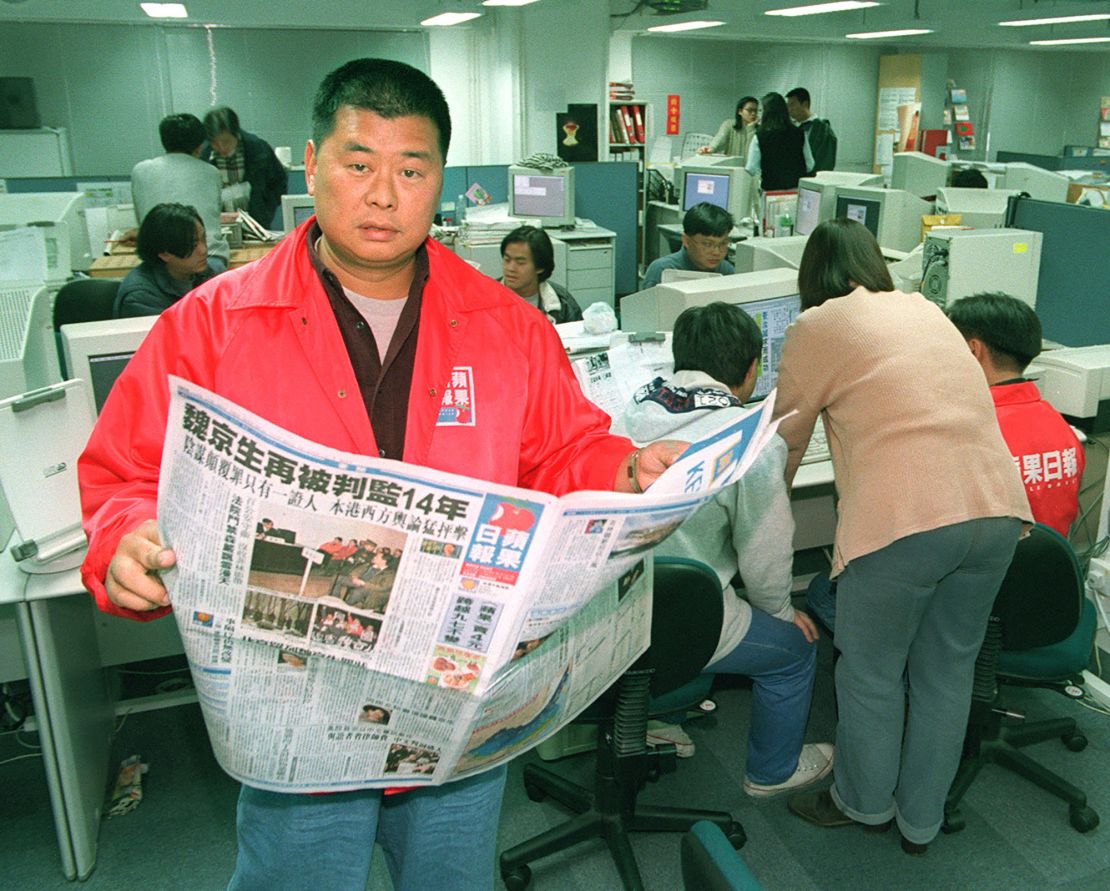
Apple Daily launched with a 100 million Hong Kong dollar ($12.9 million) promotional campaign and sparked a citywide price war on newstands, with Lai virtually giving away the title at two Hong Kong dollars (25 cents), the price vendors charged to sell it.
Before 1995, the Oriental Daily News was considered the clear market leader, although exact readership figures are hard to verify due to a lack of independent audits. Court documents from 1998 say the newspaper had a 53% share of the “vibrant newspaper market.”
“Jimmy busted open their distribution network,” says Simon, who is Lai’s long-time, right-hand man, explaining that Apple Daily negotiated its way onto newsstands that were typically reluctant to sell competitors of the Oriental Daily News.
Apple Daily began to dent the Oriental Daily News’ readership. “Jimmy didn’t realize that this would prove to be such an enormous affront to this paranoid bunch of people who were busy, on the one hand, trying to clear up their name, and on the other hand, make sure that they were still the most dominant publication in the market,” said a long-time observer of the Oriental Daily News.
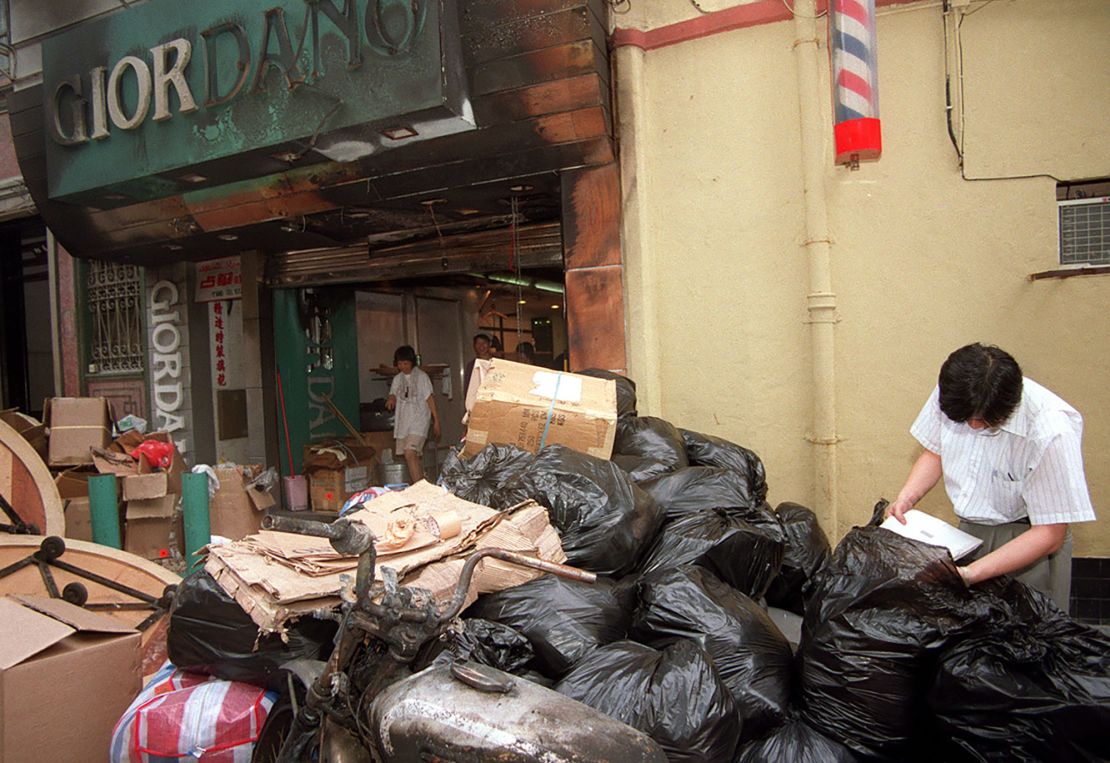
As the media landscape migrated towards digital in the 21st century, Apple Daily was an early adopter, pioneering a hugely successful video animation news format, and launching a website distinct from its newspaper, while the Oriental Daily News continued to upload PDFs of its print product to the web. The latter newspaper’s political position was not as well-defined as Apple Daily’s, with other publications in the city occupying a more strident, and consistent, pro-Beijing stand.
And as Lai’s feud with the Oriental Daily News intensified, Apple Daily fanned the flames, running stories that kept pressure on the Hong Kong government to not let the surviving Ma brother return from Taiwan.
Harassment
During Lai’s court hearings last month, it emerged that since at least 2013, Oriental Daily News has paid a team of reporters to follow Lai. The reporter whom the Apple Daily founder clashed with in June 2017 admitted in court to regularly trailing Lai leaving his house and work, taking photographs and video of those he interacted with, while always keeping a decent distance and never provoking him, he claimed.
“Why would you have a whole team of people being paid salaries for years on it and to follow around somebody you don’t like?” said the close observer of the Oriental Daily News empire. “It must have cost them an absolute fortune.”
But it wasn’t the first time the Oriental Daily News had assigned reporters to tail people it didn’t like.
In 1996, the Oriental Daily News sued Next Media for publishing on its front page a picture it had taken of pop star Faye Wong picking up her luggage at Beijing Airport while pregnant, without her consent. Oriental Daily News won a small sum for the copyright violation, but was made to pay for its appeal by a judge, who separately ruled against the paper in a case in which it was charged with publishing a series of indecent photographs of naked women.
After the rulings, a team of Oriental Daily News reporters started to follow the judge around the clock, and an article in the newspaper warned him not “to take any false steps.” Photographs and articles in the Oriental Daily News detailed the judge’s movements to and from court, and made a series of racial slurs against him.
In its Kung Fu Tea column, the newspaper wrote: “Oriental does not care if you are yellow-skinned or white or a pig or a dog. In our self-defence, we are determined to wipe you all out! Here, Kung Fu Tea warns the pigs and dogs: don’t you bother me again. Otherwise, when I counterattack in self-defence, you will regret it exceedingly, you will regret it! I repeat: you will regret it very much!”
Multiple people CNN approached for interviews for this article declined to speak on the record out of concern for their personal safety.
CNN reached out to the Oriental Daily News for comment on why it had a team tracking Lai for years, and the concerns of interviewees of this article, but did not get a response.
Criminal intimidation
For two years, Hong Kong authorities did not pursue the case against Lai, despite regular articles appearing in the Oriental Daily News urging the Secretary of Justice to prosecute him. The newspaper said it sent 17 letters to the Department of Justice about the case.
Then in February this year, Lai was charged with criminal intimidation on the recommendation of Justice Teresa Cheng, who has been sanctioned in August by the United States for undermining Hong Kong’s freedoms. Arthur Lee, barrister and professional consultant at the Chinese University of Hong Kong, said generally when there is a long delay in charges being filed it can be due to a need to find more evidence, or difference in opinion as to whether to prosecute.
In a statement provided to CNN in response to a question on the initial delay in prosecuting the case, a spokesman for the Department of Justice said that it was “not appropriate for the Department of Justice to comment on the matter.”
“I consider it somewhat farcical that this even came to trial,” said Simon. “They harassed a guy to try to get a response and they got a response — but they didn’t get a guy trying to criminally intimidate anybody.”
In the judge’s verdict on Thursday, she said she could not “believe the reporter is an honest and reliable witness” and was not convinced he was “genuinely scared.” The court heard the reporter was seen smiling after the exchange with Lai.
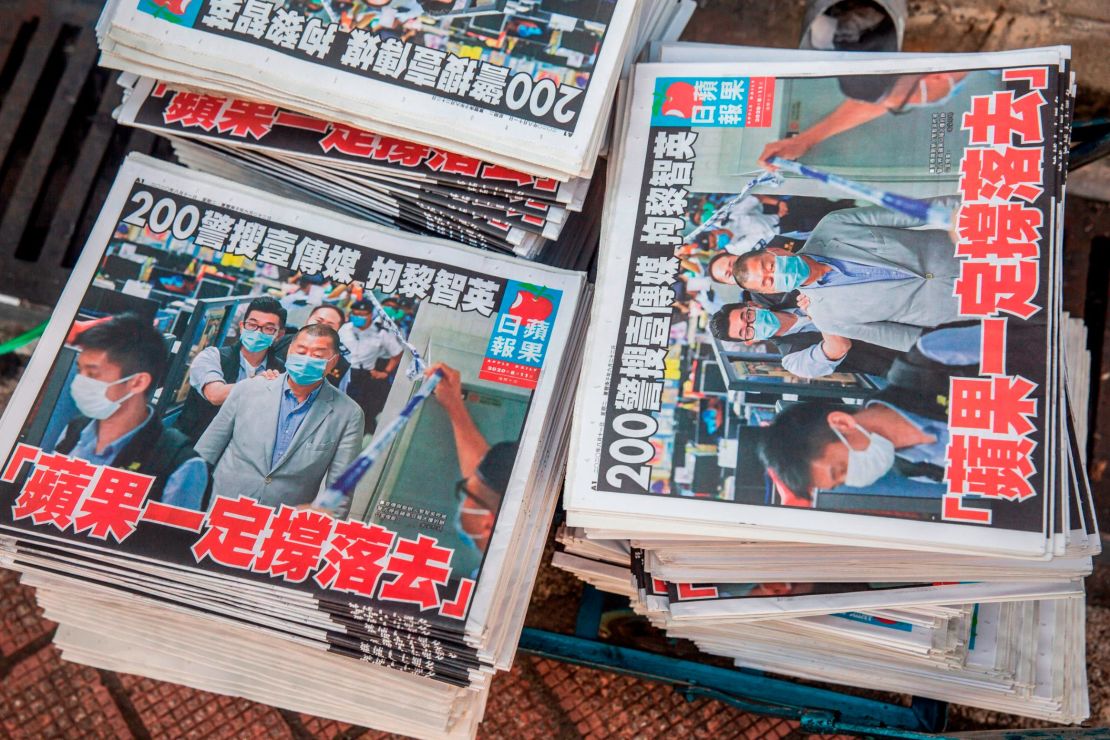
There are still more opportunities for Lai to go to jail this year. In February and April, Lai was charged with unlawful assembly for joining protests that were banned by the government in August and October last year. Each charge carries a maximum sentence of five years in prison. And Lai remains the most high-profile figure to be arrested under the national security law.
So far, the publicity around Lai’s arrests has given the Apple Daily a boost. Supporters last month rallied to buy Next Media stock, take out adverts in the paper and snap it up on news stands, causing it to sell out across the city and sell more than half a million copies in one day. Simon says digital subscriptions for Apple Daily, which launched an English-language version this year, are up by about 15% to 720,000, since the law came in.
That support is welcomed. Next Media reported a loss of 415 million Hong Kong dollars ($54 million) for the 12 months to March — a near 20% increase in year-on-year losses.
On its website, the Oriental Daily News says it had 3,486,550 readers in 2017, the most recent figures it has published, which are not independently verified but would put it far ahead of Apple Daily’s readership. Clement So, from Chinese University of Hong Kong, however, recently published research conducted last summer into local media readership in 2019, which gave Apple Daily a 21% share of the print market and 25.7% of the online space, compared to 20.9% and 11.1% for Oriental Daily News, respectively.
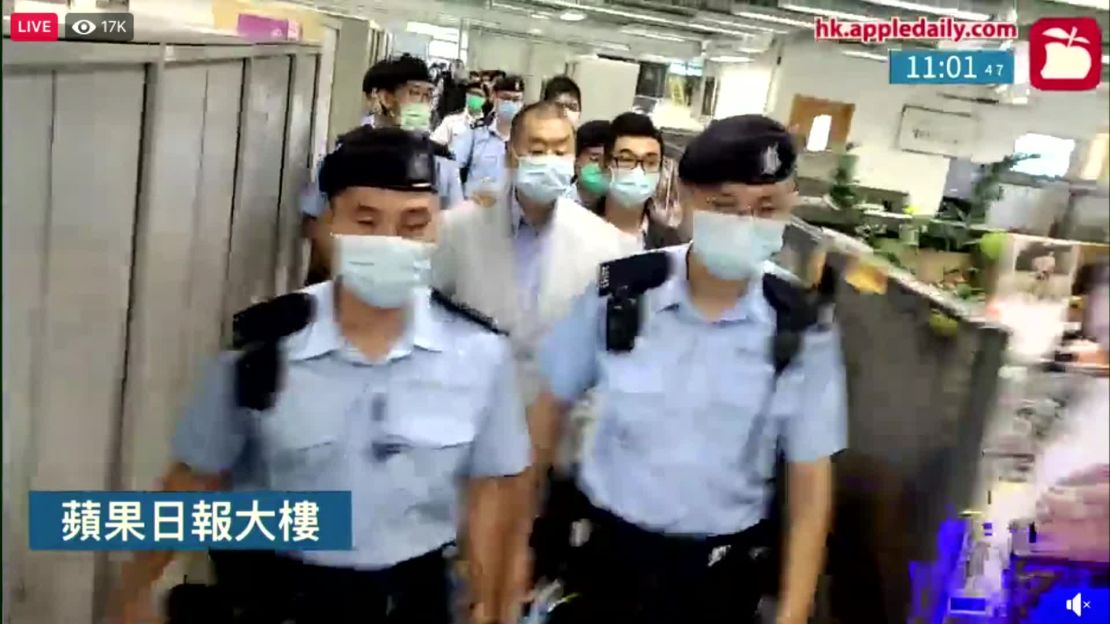
But if Lai was to be jailed, for any of the offenses he currently faces, the Oriental Daily News could find itself with a clear lead on the newsstands. Lam, the history professor and former journalist, says that in the current climate of growing media self-censorship, there is increasing worry that the Hong Kong and mainland governments will make life “more difficult for the newspaper — or even close it down.”
“Apple Daily is one of the very few media outlets which is there to criticize the Hong Kong and Beijing governments,” Lam said. Losing it would “be a loss for the Hong Kong community and a defeat for freedom of the media.”
Hong Kong Chief Executive Carrie Lam has said that the national security law won’t affect freedom of speech.
After his earlier arrest under the national security law, Lai appeared in an Apple Daily livestream with an emotional message: “I have lived in Hong Kong for more than 60 years, but I have never felt so touched and happy before,” he said.
“I don’t feel miserable about being handcuffed, neither do I feel humiliated, not at all … I am doing all these because this place has treated me too well and this is what I should.”
The battle on the newspaper stands lives to see another day.
